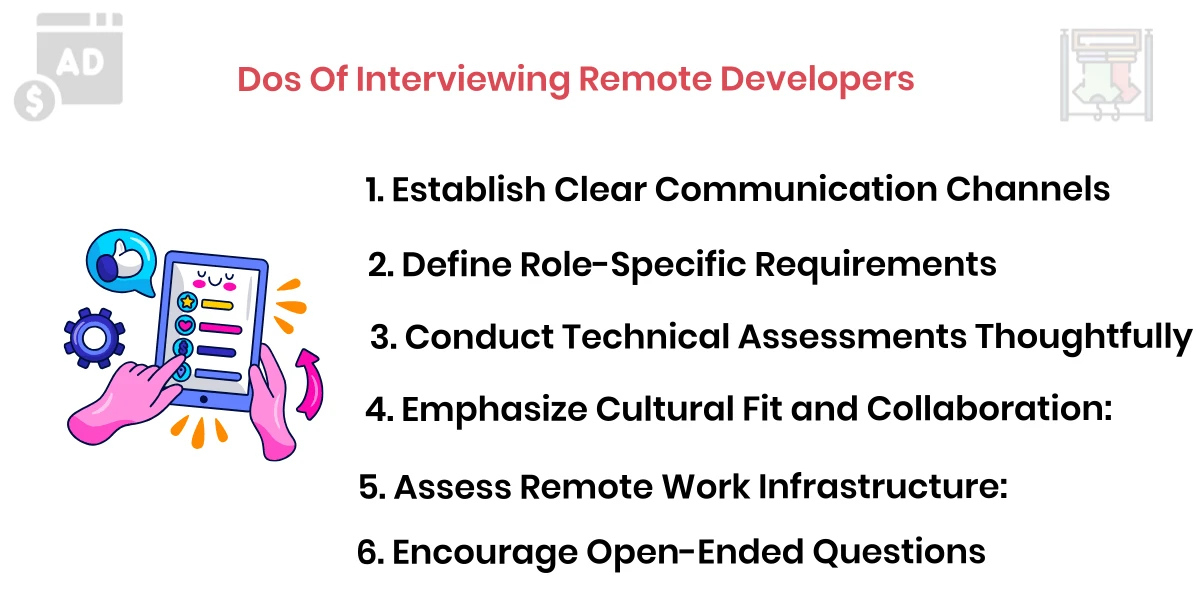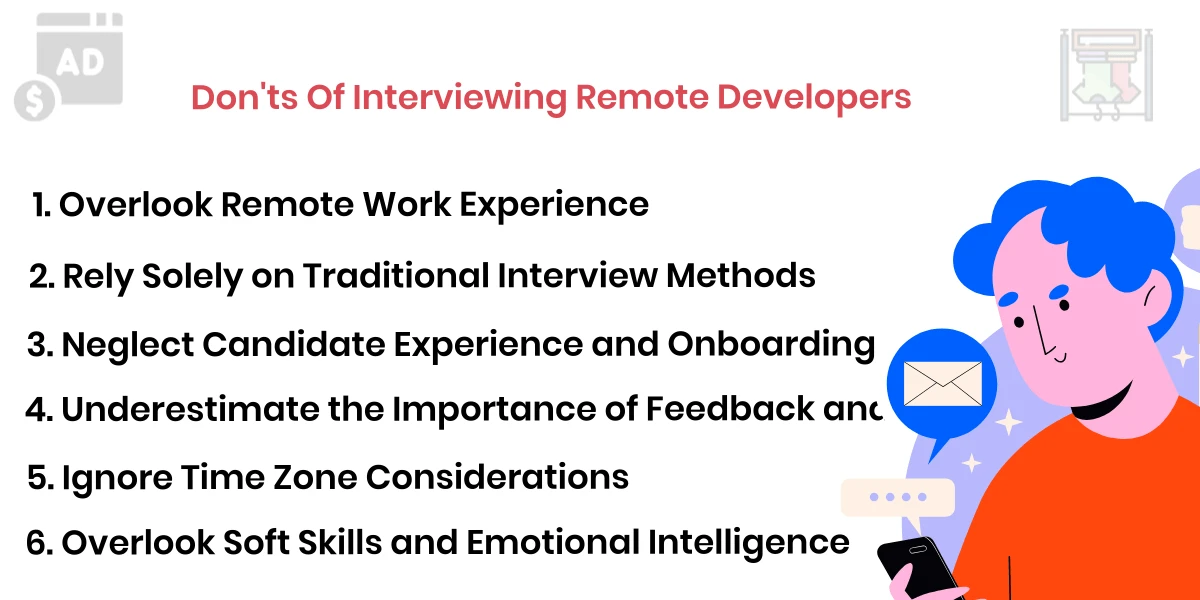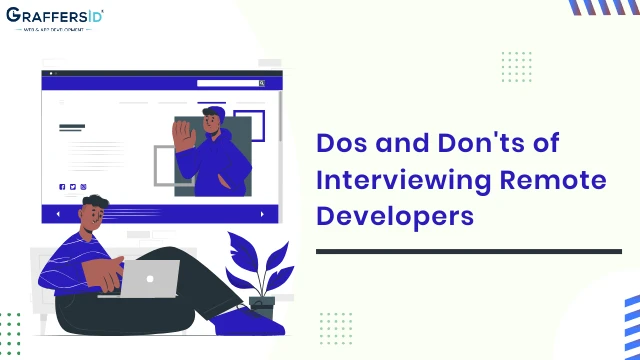In today’s dynamic and interconnected world, the concept of remote work has gained tremendous momentum, especially in the realm of software development. As companies strive to harness global talent and expand their reach, interviewing remote developers has become an integral part of the hiring process for CEOs, CTOs, project managers, and startup founders alike. However, navigating this terrain requires a nuanced approach to ensure successful outcomes. In this guide, we’ll delve into the Dos and Don’ts of Interviewing Remote Developers, equipping you with the knowledge and strategies to build high-performing remote teams.
Dos Of Interviewing Remote Developers

-
Establish Clear Communication Channels:
Effective communication lies at the heart of remote collaboration. Prioritize platforms and tools that facilitate seamless interaction, such as video conferencing software, project management systems, and instant messaging apps. Setting clear expectations regarding communication frequency, preferred channels, and response times fosters transparency and minimizes misunderstandings.
-
Define Role-Specific Requirements:
Tailor your interview process to align with the specific requirements of the role. Develop a comprehensive understanding of the skills, experience, and competencies essential for success in a remote environment. Craft interview questions that assess not only technical proficiency but also remote work skills such as self-discipline, time management, and adaptability.
-
Conduct Technical Assessments Thoughtfully:
Leverage a combination of technical assessments and practical exercises to evaluate candidates’ capabilities accurately. Design coding challenges, take-home assignments, or pair programming sessions that simulate real-world scenarios and showcase candidates’ problem-solving abilities. Strive for a balance between assessing technical proficiency and evaluating candidates’ compatibility with remote work dynamics.
-
Emphasize Cultural Fit and Collaboration:
Beyond technical aptitude, prioritize cultural fit and collaboration during the interview process. Remote teams thrive on trust, camaraderie, and shared values. Incorporate behavioral questions that gauge candidates’ teamwork skills, communication style, and ability to thrive in a distributed work environment. Look for individuals who demonstrate a strong sense of accountability, initiative, and cultural alignment.
-
Assess Remote Work Infrastructure:
Prioritize candidates who demonstrate proficiency in utilizing remote work tools and technologies. Evaluate their familiarity with collaboration platforms, version control systems, and remote project management tools relevant to your organization. Look for candidates who can seamlessly integrate into your existing remote work infrastructure and contribute to the team’s productivity from day one.
-
Encourage Open-Ended Questions:
Foster meaningful dialogue and deeper insights by asking open-ended questions during interviews. Encourage candidates to share their experiences, perspectives, and problem-solving approaches. Utilize behavioral interviewing techniques to uncover candidates’ motivations, decision-making processes, and problem-solving skills in remote work scenarios. Emphasize active listening and empathetic communication to build rapport and glean valuable insights into candidates’ suitability for remote roles.
-
Promote Diversity and Inclusion:
Embrace diversity and inclusion as integral components of your remote hiring strategy. Cultivate a diverse talent pool by actively sourcing candidates from varied backgrounds, experiences, and perspectives. Prioritize inclusive language, practices, and policies throughout the recruitment process to attract and retain diverse talent. Create an inclusive remote work culture that values and respects individuals’ differences, fostering creativity, innovation, and collaboration across the team.
-
Provide Opportunities for Collaboration and Feedback:
Facilitate opportunities for candidates to collaborate with existing team members and stakeholders during the interview process. Organize virtual team meetings, brainstorming sessions, or cross-functional projects to assess candidates’ teamwork and interpersonal skills. Encourage candidates to seek and provide feedback throughout the interview process, demonstrating a commitment to continuous improvement and mutual respect.
Don’ts Of Interviewing Remote Developers

-
Overlook Remote Work Experience:
While technical skills are undoubtedly important, overlooking candidates’ remote work experience can be a costly mistake. Remote work presents unique challenges and requires a distinct set of competencies. Prioritize candidates who have a proven track record of thriving in remote or distributed teams, demonstrating self-motivation, autonomy, and effective remote communication skills.
-
Rely Solely on Traditional Interview Methods:
Resist the temptation to rely solely on traditional interview methods when assessing remote developers. Phone screenings and face-to-face interviews offer limited insights into candidates’ suitability for remote work dynamics. Instead, leverage video interviews to gauge candidates’ communication skills, professionalism, and remote presence. Consider incorporating virtual collaboration exercises or role-playing scenarios to assess candidates’ ability to collaborate effectively across geographical boundaries.
-
Neglect Candidate Experience and Onboarding:
The candidate experience extends beyond the interview itself and encompasses every touchpoint with your organization. Neglecting to prioritize candidate experience during the hiring process can deter top talent and tarnish your employer’s brand. Ensure seamless communication, timely feedback, and transparency throughout the recruitment journey. Prioritize a structured onboarding process tailored to remote employees, providing comprehensive resources, training, and support to facilitate their integration into the team.
-
Underestimate the Importance of Feedback and Iteration:
Continuous improvement lies at the core of successful remote hiring practices. Solicit feedback from candidates, hiring managers, and team members to identify areas for enhancement in your interview process. Iterate on your approach based on lessons learned and evolving best practices in remote recruitment. Embrace a growth mindset and remain adaptable in refining your strategies to attract and retain top remote talent.
-
Ignore Time Zone Considerations:
Neglecting to account for time zone differences can lead to logistical challenges and communication breakdowns in remote teams. Avoid scheduling interviews or meetings during inconvenient hours for candidates based in different time zones. Respect candidates’ availability and accommodate scheduling preferences to ensure a seamless and respectful interview experience. Leverage scheduling tools and time zone converters to streamline coordination and minimize potential disruptions.
-
Overlook Soft Skills and Emotional Intelligence:
Technical proficiency is essential, but overlooking candidates’ soft skills and emotional intelligence can undermine team dynamics and collaboration in remote settings. Avoid prioritizing technical prowess at the expense of interpersonal skills, empathy, and emotional intelligence. Look for candidates who demonstrate strong interpersonal communication, conflict resolution, and empathy, fostering a positive remote work culture built on trust, respect, and mutual support.
-
Neglect Candidate Well-being and Work-Life Balance:
Remote work offers flexibility and autonomy, but it also blurs the boundaries between work and personal life. Avoid neglecting candidates’ well-being and work-life balance during the interview process. Respect candidates’ boundaries, availability, and personal commitments, and refrain from expecting immediate responses outside of agreed-upon working hours. Prioritize a healthy work-life balance and advocate for policies and practices that support employee well-being and mental health in the remote work environment.
-
Underestimating the Importance of Follow-Up and Closure:
The interview process doesn’t end with the final interview. Ensure timely follow-up and closure for all candidates, regardless of the outcome. Communicate transparently and respectfully, providing constructive feedback and guidance to candidates throughout the recruitment journey. Maintain ongoing communication with top candidates to keep them engaged and informed about the status of their applications. Uphold your organization’s reputation and commitment to professionalism by delivering a positive candidate experience from start to finish.



